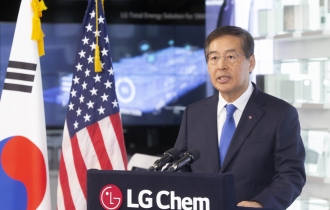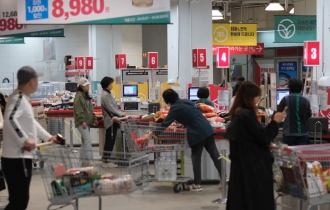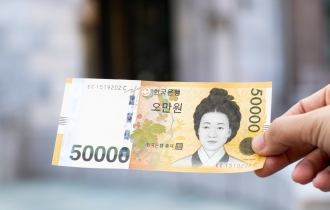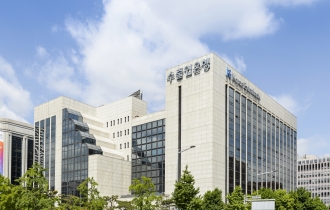Investors continue to shut small-caps on Kospi
[THE INVESTOR] Record market rallies in South Korea, mainly spurred by large-cap stocks such as Samsung Electronics, showed that investors rely on anticipations for upbeat earnings on the back of robust exports and a rise in oil prices, rather than small cap stocks exposed to potential credit risks.
For the past seven trading days until Oct. 18, the main bourse index Kospi rose 3.4 percent, according to the Korea Exchange. The Kospi‘s LargeCap index rose 3.7 percent, while its SmallCap index fell 0.1 percent. The second-tier bourse index Kosdaq rose 2.4 percent over the cited period.
Offshore investors have net purchased stocks worth 1.62 trillion won ($1.43 billion) for the past seven trading days until Wednesday, since the market resumed operation on Oct. 10 after a 10-day holiday break, showed another set of data by the Korea Exchange.
About one-third of the net purchase, worth 524.8 billion won, went to market bellwether Samsung Electronics, which accounts for over 20 percent of the main bourse’s market cap. Over the cited period, Samsung Electronics soared 6.8 percent.
This was followed by other Kospi-listed large-cap shares Hyundai Heavy Industries, LG Electronics, Hyundai Motor and Samsung SDI, which saw foreign net purchase worth 246 billion won, 131.2 billion won, 106.4 billion won and 90.3 billion won, respectively.
Large cap stocks in Korea still “dominantly appeal to foreign investors,” coupled with strong exports and an oil price hike, analyst said.
An oil price rise usually precedes the increase in volume of exports by a month, according to Gwak Hyun-soo, an analyst at Shinhan Financial Investment.
Another analyst, Ko Gyeong-beom of Yuanta Securities, wrote in a report on Oct. 19 that the small caps have little room for stock price growth in the middle of large cap boom.
“For small and mid-sized caps to outperform large caps, the large firms must see either drops in revenue or their confidence in earnings forecast undermined,” Ko wrote, while adding the robust fundamentals in large caps leave little possibility of that happening.
He also wrote the record-high volume of Kosdaq-listed firms‘ outstanding balance, which stood at 4.6 trillion won as of Sept. 22, is “exposing the small-cap stocks to the threats when they undergo slumps in stock markets.” This also amounted to over 2 percent of the entire market cap, reaching the record-high of 2.14 percent.
Kospi on Oct. 19 ended 0.4 percent lower. The index turned weak at around noon, an hour after China released its third-quarter growth by 6.8 percent, down 0.1 percentage point from a quarter prior, This came in spite of the Bank of Korea’s uplift of growth forecast this year to 3 percent and inflation rate to 2 percent, both up 0.2 percentage point, as well as new highs in Wall Street.
By Son Ji-hyoung/The Korea Herald (consnow@heraldcorp.com)
EDITOR'S PICKS
- LG Chem eyes new leap into top science company
- Korea enters clear growth path as Q1 growth hits 2-year high
- Hyundai, Kia seek to boost presence in China market
- 7 out of 10 wealthy Koreans offer grim outlook for 2024
- [KH Explains] Korean shipbuilding stocks rally: Real growth or bubble?
- [Hello India] Hyundai Motor vows to boost 'clean mobility' in India
- Eximbank to nurture regional development specialists
- [From the Scene] KG Mobility poised to take next leap










![[KH Explains] Korean shipbuilding stocks rally: Real growth or bubble?](http://res.heraldm.com/phpwas/restmb_idxmake.php?idx=141&simg=/content/image/2024/04/25/20240425050656_0.jpg)
![[Hello India] Hyundai Motor vows to boost 'clean mobility' in India](http://res.heraldm.com/phpwas/restmb_idxmake.php?idx=141&simg=/content/image/2024/04/25/20240425050672_0.jpg)

![[From the Scene] KG Mobility poised to take next leap](http://res.heraldm.com/phpwas/restmb_idxmake.php?idx=141&simg=/content/image/2024/04/24/20240424050621_0.jpg)

